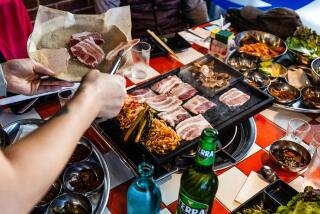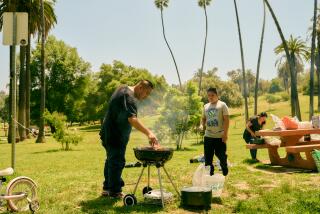When dreams fall off the skewer
- Share via
Kell Phelps’ family bit into the pork ribs that he barbecued for the reunion and gasped. Then, they reached for the iced tea. Of the 45 relatives assembled, only Uncle Marlin ate the ribs.
Phelps eventually realized he’d mistaken cayenne pepper for paprika when he seasoned the meat.
“Barbecuing is like riding a motorcycle -- it’s inevitable that one day you are going to wipe out,” says Phelps. “I don’t know any cook who hasn’t screwed up or had some kind of disaster.”
It is inevitable that barbecuers blunder -- the threat of calamity is part of the thrill of the grill. And this weekend promises a surge of outdoor cooking. In the world of barbecue, from die-hard grill maestros and rib gypsies to backyard bubbas bandying burgers, Labor Day is the final leg of a Triple Crown that began with Memorial Day and Independence Day. It’s one more chance to wow family, win friends and woo lovers. And it is an opportunity for redemption. Or not.
For most cooks, their misfortunes remain private, perhaps the subject of ribbing by children, spouses or friends. But Bruce Bjorkman’s worst disaster was televised. Live.
Bjorkman, who hosts his own Portland radio show, “Cooking Outdoors With Mr. Barbecue,” was invited to appear on local TV, and, as the cameras rolled, he started to barbecue chicken. The show hosts, however, told him to hurry because they had to lop two minutes off his segment. Rattled, Bjorkman pulled the golden brown chicken off the grill and placed it on the platter that had carried the raw poultry -- presenting a health hazard that even rookies understand. Then he served it to the show hosts, who ate without blinking.
No one, however, got sick.
“You know, I’m human,” says Bjorkman, author of “The Great Barbecue Companion: Sops, Mops, Sauces and Rubs.” “We all make mistakes. Sometimes one person sees it; sometimes thousands.”
When it comes to barbecuing, disaster can take many forms. Jerry Scott’s knee-high mutt, Rolly, ignored the hot dogs and snatched the porterhouse steak off the grill when Scott went into his Downey home to check the rest of the meal.
But most mishaps occur because of simple human error.
In hopes of impressing a visiting Danish relative, one Northern Californian man tossed a 2-pound polypropylene bag of WW Wood Hickory wood chips into the barbecue along with racks of ribs. When he returned, the blackened ribs smoldered with melted plastic and the ambient air reeked like a meltdown at a factory.
Later, the thwarted cook explained that he hadn’t read the instructions (which call for no more than two handfuls of chips) and that he’d figured the bag was a newfangled burnable plastic.
In Phelps’ case, some family members chalked up the over-spiced ribs to plain bad luck. His father, however, suggested he needed new glasses.
“Believe it or not, I still get to cook,” says Phelps, who is owner and publisher of the Georgia-based National Barbecue News.
In hopes of aiding wanna-be chefs, Weber -- one of the largest barbecue manufacturers -- hosts a summertime hotline, similar to the one for flustered turkey cooks at Thanksgiving.
Dorothy Jones has staffed the Weber hotline -- (800) GRILL-OUT -- for the last 11 years. Most of her days are spent addressing questions about ribs (three or four pounds of boneless cook in one hour) and steak (a 1-inch thick slab takes 12 minutes).
But occasionally, Jones fields a question that probes the limits of her considerable grill knowledge. One time a woman in Maine wanted recipes for grilling moose because her husband had hit one with his motorcycle.
Another caller wanted to smoke a 2-pound chunk of bologna, Jones recalled. The man explained he wanted the bologna, which is already cooked, to be imbued with a smoky flavor. (Jones suggested 15 minutes in a grill fed by wood pieces.)
The quest for that distinctive tangy flavor and the succulent tenderness of properly barbecued meat lures more and more Americans yearly. Today, 76% of American households own grills, and 60% use them year-round, said Donna Myers, a spokeswoman for the Hearth, Patio & Barbecue Assn.
Most of the time, it’s Dad who’s firing up the barby. Men are twice as likely as women to barbecue, according to the Virginia-based industry group.
In part, this may account for an oral tradition that never fails to delight the assembled group: retelling past fiascos. It is, after all, a chance to poke fun at an authority figure in the household.
But it is also a way of reassuring ourselves that our lives are improving. Sure, Dad burnt the steaks last year, but not this year.
“When those disasters happen, it’s not funny, but after a few years, people can talk and laugh about it,” says George M. Scott, associate professor of cultural anthropology at Cal State Long Beach. “In American culture, people like to believe things are better than the past.”
With barbecuing, the window for misfortune is large. A sudden rain can put the kibosh on even the simplest meal. The marinade that drips into the fire can ignite the rosemary chicken. The folding table can collapse, buckling under the weight of brisket, ribs, potato salad, beans and cornbread.
And sometimes the coals aren’t the only things that catch fire.
Barbecues are relatively safe -- Los Angeles County officials couldn’t remember the last serious fire caused by a grill. Nationwide, in 1999, gas and charcoal grills caused 1,500 structure fires and 4,200 outdoor fires at homes, according to the National Fire Protection Assn. Given the millions of barbecues, it’s an extremely small number, just 1.3% of all fires at home properties.
Not all calamities are fire- or food-related, however. One man wanted to rid his grill of a foul odor, recalls Steve Pulone, owner of a Glendora barbecue shop.
What caused the stench? Pulone asked.
The man had cremated their dead dog because he and his wife wanted to keep its ashes.
Solution: Buy a new grill.
As grills incorporate more technology, cooking is not necessarily easier. In 10 minutes, an infrared grill, for instance, will reach 1,650 degrees -- a temperature hot enough to carbonize duck a l’orange.
No matter what the cause, barbecue catastrophes are humbling.
Alan Citron’s acquaintances gathered to watch him cook, having heard that he was something of a sensation with a grill. With the demeanor of a pro, Citron gently laid a salmon on the poolside barbecue for a formal summer dinner at his Sherman Oaks home. Minutes later, the grill became eerily quiet. The fish stopped sizzling.
Problem? No more propane.
“It was mortifying,” Citron says. “Nobody really cares, but you’ve plotted out this experience that you want your guests to have. And this wasn’t it.”
Citron’s humiliation occurred before six dinner guests, but Mike Mills had 100.
Mills caters events and runs four restaurants, including three -- called Memphis Barbecue -- in Las Vegas.
Hired for a computer company party, Mills arrived the evening before and spent 20 hours roasting a 120-pound hog.
Mills has cooked about 300 hogs, so he knew the drill. The hog turned golden brown, and the aroma of tender pork wafted through the crowd as hungry guests gathered to admire the masterpiece.
Just as Mills prepared to remove the meat from the flames, the hog tumbled into the fire. The crowd moaned.
“I felt heartsick,” says Mills of Murphysboro, Ill. “Did you ever have your heart fall out from under you?”
The side dishes were ready, but the main course was coated with dust and ash. Mills apologized to the host and then asked if there were a restaurant nearby.
“If you’ve got a disaster,” he says, “the parade needs to go on.”
*
(Begin Text of Infobox)
Morsels of trivia
* In 1991, 69 million U.S. households owned a barbecue grill (73% of 94 million). In 2001, 80 million households owned a barbecue grill (76% of 105 million).
*The average price of a charcoal stand-up covered grill is $65. The average price of a gas stand-up covered grill is $210.
*Eighty-one percent of barbecuers say their No. 1 utensil for side dishes is aluminum foil.
*Seventy-two percent of barbecuers say they sometimes use barbecue sauce; 16% say they always use it; 12% say they never use it.
*Most popular utensils owned:
Long-handled tongs: 81%
Long-handled fork: 80%
Cleaning brush: 69%
Gloves or mitts: 48%
Skewers: 45%
Meat thermometer: 34%
*
Source: Hearth, Patio and Barbecue Assn.
More to Read
Eat your way across L.A.
Get our weekly Tasting Notes newsletter for reviews, news and more.
You may occasionally receive promotional content from the Los Angeles Times.










